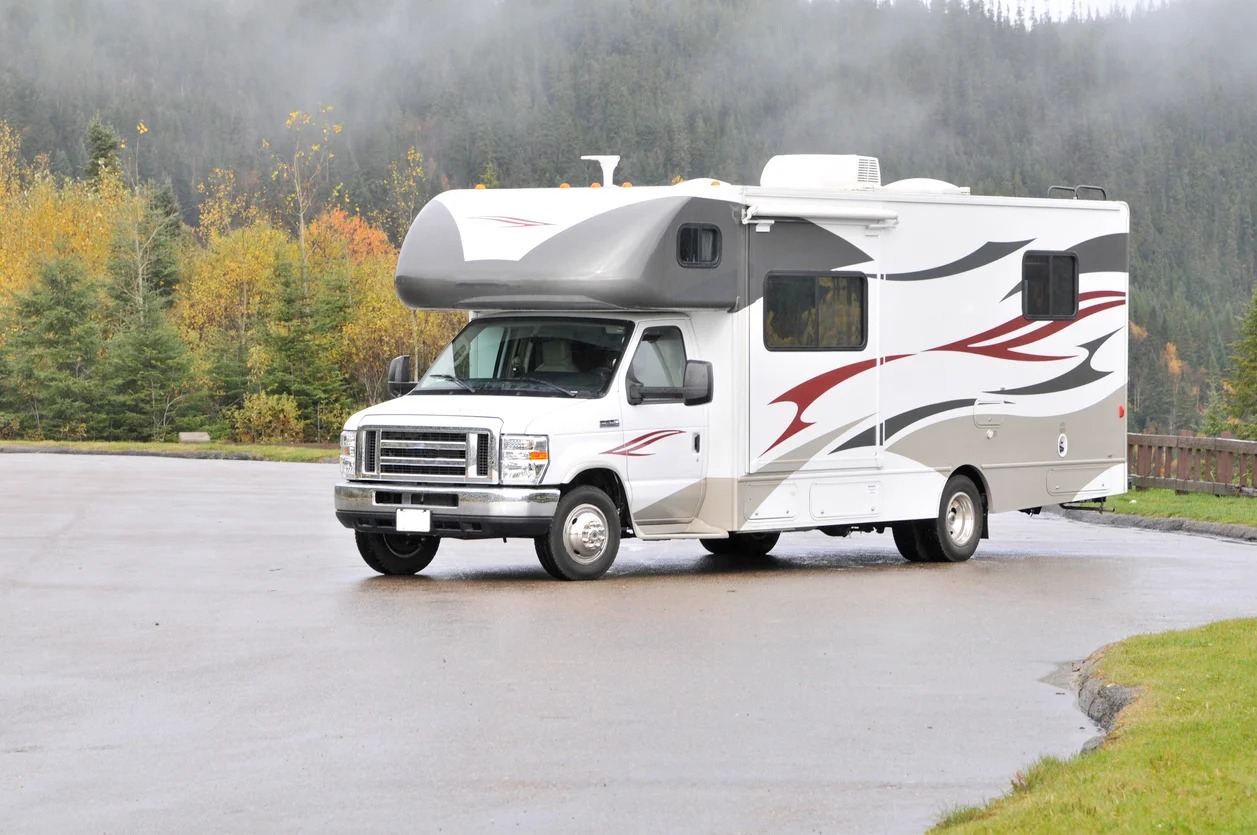

Finance
What Credit Score Is Needed To Buy An RV
Published: October 22, 2023
Find out the credit score required for financing your dream RV. Explore financing options and tips to secure the best deals.
(Many of the links in this article redirect to a specific reviewed product. Your purchase of these products through affiliate links helps to generate commission for LiveWell, at no extra cost. Learn more)
Table of Contents
Introduction
Purchasing an RV (Recreational Vehicle) is a dream for many adventure enthusiasts and travel lovers. The freedom to explore the open road, embark on unforgettable trips, and create memorable experiences is an enticing prospect. However, like any major financial decision, buying an RV requires careful consideration, including understanding the credit score requirements.
While it might not be the first thing that comes to mind when thinking about RV ownership, your credit score plays a crucial role in securing the financing needed to make your dream a reality. Lenders rely on credit scores to assess your financial reliability and determine the terms of your loan. Therefore, having a good credit score can greatly impact your ability to obtain favorable loan terms and interest rates.
In this article, we will explore the various factors to consider when buying an RV, including an in-depth look at credit scores and their importance during the financing process. We will also discuss the minimum credit score requirements for RV loans and provide valuable tips for improving your credit score. Finally, we will explore alternative financing options for individuals with lower credit scores.
Whether you’re a seasoned adventurer or a first-time RV buyer, understanding the significance of your credit score can help you navigate the financing process with confidence, securing the best terms available.
Factors to Consider When Buying an RV
Before diving into the credit score requirements for buying an RV, it’s essential to consider a few factors that can greatly impact your decision-making process. Understanding these factors will help you make a well-informed choice and find the perfect RV for your needs. Here are some key considerations:
- Budget: Determine how much you can comfortably spend on purchasing an RV. Consider not only the cost of the RV itself but also ongoing expenses such as insurance, maintenance, fuel, and campground fees.
- RV Type: There are different types of RVs, including motorhomes, towable trailers, and camper vans. Each type has its advantages and considerations, so carefully evaluate which one suits your lifestyle and travel preferences.
- Size and Layout: Think about the number of people who will be using the RV and the amenities you desire. Consider factors such as the number of beds, bathroom facilities, kitchen appliances, storage space, and overall livability.
- Usage Frequency: Determine how often you plan to use the RV. If you’re a full-time RVer, you may require a different type of RV than someone who plans occasional weekend getaways.
- Resale Value and Depreciation: RVs, like all vehicles, depreciate over time. Research the resale value of different RV models and brands to ensure you’re making a wise investment.
- Insurance: Explore insurance options for your RV and factor in the associated costs. Insurance is important to protect your investment and provide peace of mind during your travels.
- Serviceability and Repairs: Consider the availability of RV service and repair facilities in your area. Having convenient access to reliable maintenance and repairs is crucial to keep your RV in good condition.
- Towing Capacity and Licensing: If you plan to tow a trailer, ensure that your vehicle has the necessary towing capacity. Additionally, familiarize yourself with any licensing requirements for driving larger RVs.
By thoroughly evaluating these factors, you can narrow down your options and select an RV that aligns with your budget, lifestyle, and travel goals. Once you have a clear understanding of your needs, you can proceed to explore the financing options available to turn your RV ownership dream into a reality.
Understanding Credit Scores and Their Importance
Before delving into the credit score requirements for purchasing an RV, it’s essential to have a good understanding of credit scores and why they matter. Your credit score is a numerical representation of your creditworthiness and financial behavior, ranging from 300 to 850.
Lenders use your credit score to assess the level of risk involved in lending you money. A higher credit score indicates a lower risk, making you more likely to qualify for loans and credit cards with favorable terms and interest rates.
When you apply for an RV loan, the lender will review your credit score, along with other factors such as income, debt-to-income ratio, and employment history. A good credit score not only makes it easier to acquire financing but also enables you to access lower interest rates, which can save you thousands of dollars over the life of your loan.
Credit scores are determined by several key factors, including:
- Payment History: Your payment history plays a significant role in determining your credit score. Consistently making on-time payments and paying off debts will positively impact your credit score.
- Credit Utilization: This is the amount of credit you’re using compared to your overall credit limit. Keeping your credit utilization below 30% demonstrates responsible credit management and can boost your credit score.
- Length of Credit History: The longer your credit history, the more information lenders have to evaluate your financial behavior. Generally, a longer credit history is seen as a positive factor.
- Credit Mix: Having a mix of different types of credit, such as credit cards, loans, and mortgages, can positively impact your credit score. However, it’s important to responsibly manage all types of credit.
- New Credit Inquiries: When you apply for new credit, it can temporarily impact your credit score. Multiple inquiries within a short period can indicate financial instability, so it’s best to avoid unnecessary credit applications.
Understanding the factors that contribute to your credit score empowers you to take control of your financial health. Aim to maintain a good credit score by practicing responsible credit behavior, such as paying bills on time, keeping credit utilization low, and avoiding excessive new credit applications.
With a solid understanding of credit scores and their importance, you’ll be well-equipped to navigate the credit score requirements for RV loans and take steps to improve your credit standing if needed. In the next section, we’ll explore the minimum credit score requirements for obtaining an RV loan.
Minimum Credit Score Requirements for RV Loans
When it comes to financing the purchase of an RV, lenders have specific credit score requirements that borrowers must meet. While these requirements may vary between lenders, there are some general guidelines to keep in mind.
Typically, a minimum credit score of around 660-700 is considered satisfactory for RV loan approval. However, it’s important to note that credit scores are just one aspect of the overall evaluation process. Lenders also consider factors such as income, debt-to-income ratio, employment history, and the loan-to-value ratio (LTV), which refers to the loan amount compared to the RV’s value.
It’s worth mentioning that higher-end RVs or luxury models may require a higher credit score for loan approval, as they are considered higher-risk investments. On the other hand, entry-level or used RVs may have more flexible credit score requirements.
If your credit score falls below the minimum requirements, it doesn’t necessarily mean you won’t be able to secure an RV loan. There are alternative financing options available for individuals with lower credit scores, which we will explore later in this article.
Additionally, it’s important to be aware that even if you meet the minimum credit score requirements, having a better credit score can offer significant advantages. A higher credit score can lead to lower interest rates, more favorable loan terms, and potentially higher loan amounts.
Before applying for an RV loan, it’s best to review your credit report to ensure its accuracy. You can obtain a free copy of your credit report from each of the major credit bureaus (Equifax, Experian, and TransUnion) once a year. Carefully review the report for any errors or discrepancies and resolve them promptly.
Remember, meeting the minimum credit score requirements is just one step in securing an RV loan. It’s also important to have stable income, a reasonable debt-to-income ratio, and a good payment history. By presenting a strong financial profile, you enhance your chances of obtaining the RV loan you desire.
Now that we’ve discussed the credit score requirements for RV loans, let’s move on to valuable tips for improving your credit score, which can help you obtain more favorable loan terms.
Tips for Improving Your Credit Score
If your credit score is below the minimum requirements for an RV loan, don’t worry. There are actions you can take to improve your creditworthiness and increase your chances of securing better loan terms. Here are some valuable tips for improving your credit score:
- Pay your bills on time: Late or missed payments can have a significant negative impact on your credit score. Make it a priority to pay all of your bills, including credit cards, loans, and utilities, on time.
- Reduce your credit utilization: Aim to keep your credit card balances below 30% of your credit limit. To achieve this, consider paying down existing balances and avoiding new credit card charges.
- Establish a positive credit history: If you have limited credit history, consider opening a secured credit card or becoming an authorized user on someone else’s credit card. Be sure to make timely payments and keep your credit utilization low.
- Keep old accounts open: Closing old credit accounts can negatively impact your credit score by reducing the average age of your credit history. If you have old credit cards that you don’t use, it’s generally best to keep them open.
- Regularly check your credit report: Review your credit report at least once a year to ensure its accuracy and address any errors or discrepancies promptly. You can dispute inaccurate information with the credit bureaus to have it corrected.
- Avoid excessive new credit applications: Each time you apply for new credit, it can generate a hard inquiry on your credit report, which can temporarily lower your credit score. Only apply for credit when necessary.
- Pay off outstanding debts: Work on paying off any outstanding debts to reduce your overall debt level. This demonstrates responsible financial behavior and can boost your credit score.
- Consolidate your debts: If you have multiple credit card or loan balances, consolidating them into a single loan or credit card with a lower interest rate can make it easier to manage your debt and improve your credit score.
- Seek professional guidance: If you’re struggling with your credit and need guidance, consider working with a reputable credit counseling agency. They can provide personalized advice to help you improve your credit score.
Improving your credit score takes time and discipline, but the effort is worth it. A higher credit score not only increases your chances of obtaining an RV loan, but it also opens doors to better financing options and lower interest rates, ultimately saving you money in the long run.
Now that we have explored the tips for improving your credit score, let’s move on to alternative financing options for individuals with lower credit scores.
Alternative Financing Options for Lower Credit Scores
If your credit score doesn’t meet the minimum requirements for traditional RV loans, there are alternative financing options available. While these options may come with certain limitations or higher interest rates, they can still enable you to pursue your dream of owning an RV. Here are some alternative financing options for individuals with lower credit scores:
- RV-specific lenders: Some lenders specialize in providing financing specifically for RV purchases. These lenders may have more flexible credit score requirements and can work with borrowers who have less-than-perfect credit.
- Dealership financing: Many RV dealerships offer in-house financing options, allowing buyers to secure a loan directly through the dealership. These financing options may be more accessible for individuals with lower credit scores, although interest rates could be higher.
- Cosigner: If you have a family member or friend with a good credit history, you may consider asking them to cosign the loan for you. A cosigner effectively vouches for your ability to repay the loan, making it easier to obtain financing.
- Secured loans: If you have valuable assets such as a home or a substantial savings account, you could secure the RV loan with collateral. The lender has the right to seize the asset if you default on the loan, which reduces their risk and increases your chances of approval.
- Peer-to-peer lending platforms: Online platforms such as Prosper or LendingClub connect borrowers directly with individual lenders. These platforms may consider other factors beyond credit scores when determining loan eligibility and interest rates.
- Personal loans: Consider applying for a personal loan to finance your RV purchase. While interest rates may be higher, personal loans are often easier to obtain, and the funds can be used for various purposes, including buying an RV.
It’s important to note that while alternative financing options can make RV ownership possible for individuals with lower credit scores, they do come with certain drawbacks. These drawbacks may include higher interest rates, stricter loan terms, or limitations on the types or age of RVs eligible for financing.
Before pursuing alternative financing options, thoroughly research and compare different lenders and loan terms to ensure you’re getting the most suitable and affordable option for your circumstances. Carefully consider the impact of the interest rates and loan terms on your overall financial situation.
In addition to exploring alternative financing options, it’s crucial to continue working on improving your credit score. As your credit score improves, you may be able to refinance your RV loan to obtain better terms and lower interest rates in the future.
Now that we have discussed alternative financing options, let’s conclude our article with a brief summary.
Conclusion
Purchasing an RV is an exciting endeavor, but understanding the credit score requirements and financing options is key to making your dream a reality. While a good credit score is generally preferred for obtaining favorable loan terms, there are alternative financing options available for individuals with lower credit scores.
When buying an RV, it’s important to consider factors like your budget, RV type, size and layout, usage frequency, resale value, insurance, and serviceability. These considerations will help guide your decision-making process and ensure you choose the right RV for your needs.
Credit scores play a critical role when it comes to securing RV financing. Lenders assess credit scores to determine the level of risk involved in lending you money. Although minimum credit score requirements for RV loans typically range from 660-700, it’s important to aim for a higher credit score to access better loan terms and interest rates.
Improving your credit score is possible by paying bills on time, reducing credit utilization, establishing a positive credit history, keeping old accounts open, and regularly checking your credit report for errors. These steps can help you strengthen your creditworthiness and increase your chances of obtaining better loan terms.
If your credit score falls below the minimum requirements, alternative financing options may be available. RV-specific lenders, dealership financing, securing loans with collateral, peer-to-peer lending platforms, and personal loans can provide opportunities for individuals with lower credit scores to finance their RV purchase.
It’s important to carefully research and compare different lenders and loan terms to ensure you select the most suitable financing option. Keep in mind that alternative financing options may come with higher interest rates and stricter loan terms.
As you navigate the world of RV financing, remember that owning an RV comes with ongoing costs such as insurance, maintenance, and campground fees. Consider these factors along with credit score requirements when planning your overall budget.
By understanding credit scores, exploring financing options, working on improving your creditworthiness, and making informed decisions, you can pave the way to fulfilling your dream of owning an RV and embarking on unforgettable adventures on the open road.














